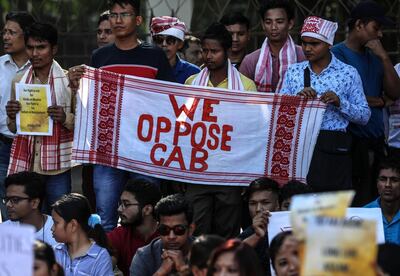A red and white cloth has come to symbolise the struggle of the Indian state of Assam's "sons of the soil" against a new citizenship law that they regard as a threat to their unique culture.
Traditionally worn by fishermen and peasants, millennials and others in the far-flung region have taken to wearing the gamosa, tying it around their heads and waists, inscribing it with anti-government slogans.
"This is like a flag for us," said student Jatin Borah, 22, one of the thousands taking to the streets in days of protests and running battles with police, which killed five people.
"It represents Assam, its culture and collective political and social aspirations of its people. It's our pride. It is uniting us."

India's north-east region, between Bangladesh, China and Myanmar, has long seethed with inter-ethnic tensions, with armed tribal groups still resisting being part of India.
Assam, in particular, has a long history of hostility between locals and Bengali-speaking immigrants who were brought in by the British to work on tea plantations, or who came in during Bangladesh's war of independence in 1971.
Years of agitation driven by student organisations, including the 1983 Nellie Massacre in which about 2,000 people were killed in six hours, ended in 1985 with the Assam Accord.
Part of the agreement was to root out foreigners and this year a contentious citizens' registry left off 1.9 million people who were unable to prove that they or their forebears were in Assam before 1971.
They face possible statelessness, incarceration in prison camps or even deportation.
Indian Prime Minister Narendra Modi has reopened old wounds with legislation passed last week that could give citizenship to 20 million immigrants living in India, including about 500,000 in Assam.
Graffiti has sprung up across Guwahati, Assam's main city and the centre of days of riots and clashes with police that killed two people and injured dozens, saying the citizenship law breaches the hard-won 1985 deal.
"The law poses a direct threat to our culture, livelihood and homeland," said Samujjal Battacharya, a senior figure in the powerful All Assam Students Union.
"We won't accept even a single immigrant. Assam has taken enough immigrants in the past."
Protesters chanted "Long Live Assam", and "Hail, Mother Assam".
Mr Battacharya wore a gamosa, as did two young women walking silently by, theirs emblazoned with a message in English and Assamese that read: "Mr Modi, Assam is not your dumping ground."
The gamosa comes in different sizes but the pattern of a red border of flowers around the white handmade cotton is the same for more than 20 tribes.
"The gamosa has been part of the life for centuries in Assam," said Bishnu Saikia, a social scientist.
Mr Saikia said it was used by farmers and fishermen "primarily to wipe sweat at work" but over the years it became part of local popular culture, evolving into a symbol of Assamese identity.
It is often given to visitors as a souvenir of the state.
"Assam's millennials and later generations have adopted it as a cultural symbol and are unabashed about flaunting it," Mr Saikia said. "It is giving them the feeling of connecting with the roots."
Another protester, Utpal Borah, said: "Our ancestors have preserved the tradition for centuries and if outsiders are allowed to settle here, this might die too.
"Our existence is under threat."














